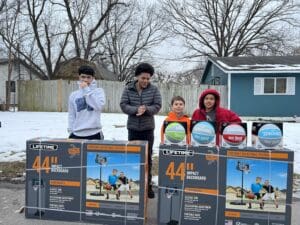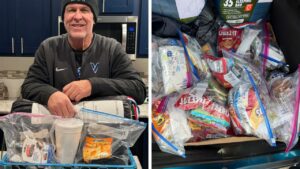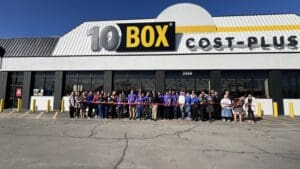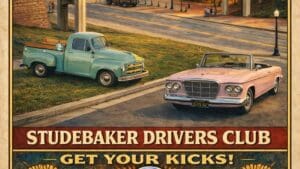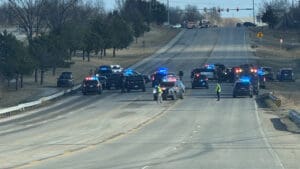“Babe, I just don’t feel good.”
It was early January of 2021, and Rodney Crall was, along with most of his immediate family, fighting the coronavirus. Christmas had passed just a few days before, and though they hadn’t done much of a celebration with anyone outside their household because of COVID, they had still contracted the virus. Kim Crall, Rodney’s wife of 37 years, had remarked that she and Rodney and Rodney’s mother Daisy had all been diagnosed on the same day. “Rodney’s dad never got it,” she said. “Still hasn’t, to this day, ever shown symptoms.”
“Our walking miracle”
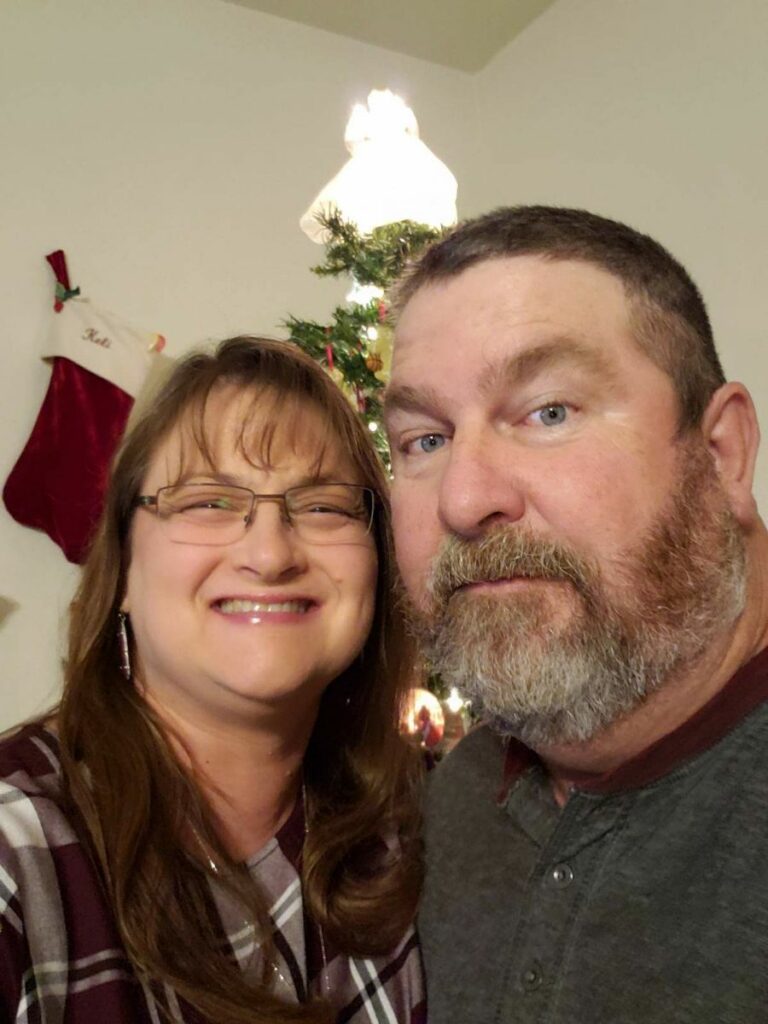
Rodney admitted during an interview this week with Sapulpa Times, “I’m stubborn sometimes.” Some of that stubbornness bore out as he struggled to overcome his sickness from the couch in his Kellyville home. At one point, Kim took his temperature; it read 105 degrees.
She called a nurse friend. “He won’t go to the hospital,” Kim told her. The friend very plainly said, “put the phone to his ear.” Kim did so, and something in that conversation changed his mind. When she hung up, he said, “Okay, let’s go.”
Rodney wouldn’t leave the hospital for ten months—and that was a miracle itself.
“We call him our Walking Miracle,” says Phyllis McGann, Rodney’s mother-in-law. “The doctors told us, ‘we’ve never seen anyone who can take literally everything COVID can throw at them and live.’”
The family rejoices today, but the journey didn’t come without its heartache. Rodney was admitted to Hillcrest South and that same day placed on oxygen. Because Kim was still COVID positive, she wasn’t allowed to be in the hospital. Doctors called her telling her, “We can’t get Rodney to keep the oxygen mask on. If he doesn’t start working with us, we’ll have to sedate him and intubate him.”
“Do what you have to do,” she said.
The next day he was transferred to Oklahoma Heart Institute’s COVID-ICU and placed into a medical coma so he could be intubated and began undergoing ECMO treatments. ECMO involves a machine that pumps and oxygenates a patient’s blood outside the body, allowing the heart and lungs to rest. In medical circles, it’s known as a hail mary.
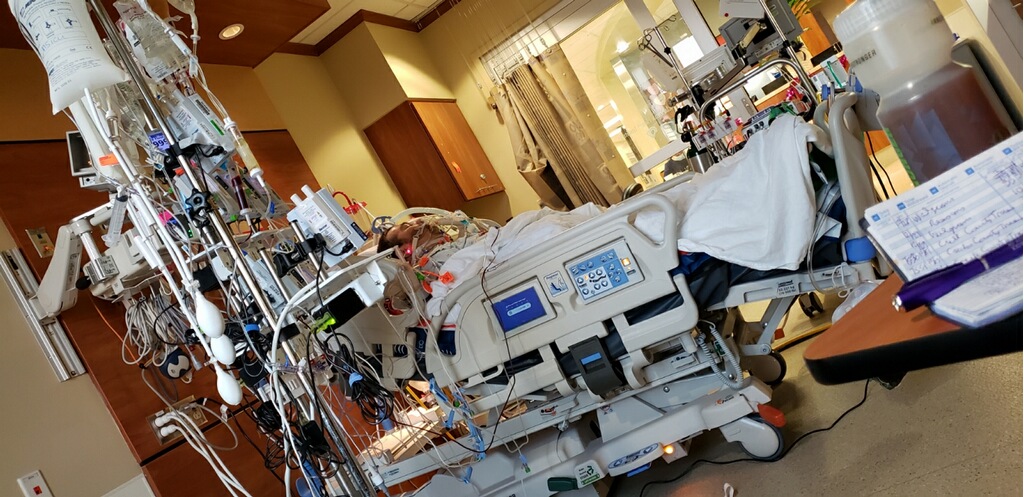
Kim wasn’t allowed to visit her husband for almost two weeks. By the time she was able to see him on January 17th, the news wasn’t good; there was a blockage in Rodney’s colon and exploratory surgery was needed. What they discovered was called “toxic megacolon”—an extreme inflammation that can cause the colon to burst. In a risky surgery, made more complicated by blood thinners that were required for ECMO, Rodney’s entire colon was removed.
On January 24th, the ECMO machine went on the fritz. Doctors told Kim they would have to see if Rodney could survive without the machine. “They began taking him off of it for just ten seconds at a time,” she said.
While she was praying that her husband would survive the procedure, the family was dealing with another tragedy: Rodney’s mother, Daisy Crall, had just passed away.
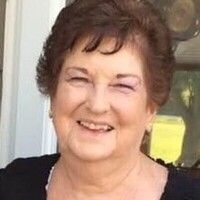
Joan “Daisy” Crall
November 25, 1941 – January 24, 2021
“Not looking good”
Kim said the death of her mother-in-law was sudden and it hit hard. Daisy had been hospitalized as well, but seemed to be recovering. “She was progressing,” she said, “and we were preparing her house for her to come home. Then suddenly, one lung collapsed, and then the other.”
Kim said the family made the decision not to tell Rodney, who, at the time Daisy passed, was still in a coma. The man was fighting his own battles, and they would tell him when he asked about her, they decided.
He woke up two days later, severely disoriented, but alive. The moment couldn’t have come at a better time: it was Kim’s birthday.
The celebration didn’t last long, however. Rodney was forced to go back on ECMO on February 15th. “The doctors didn’t sugarcoat it,” Kim said. “Things were not looking good. He was losing too much blood and they couldn’t replace it quickly enough.” As Oklahoma began to settle in for the big 2021 freeze, Rodney was fighting, but not improving. “The ventilator went up and down. They gave him a Wittmann Patch to try to stop the bleeding, but it wouldn’t stop,” she said. “Several times I would wake up hearing ‘code blue’ in the next room, and then look over at Rodney and find blood in the bed.”
On March 6th, the hospital chaplain appeared outside Rodney’s room. “It’s the twentieth day,” he said.
Doctors had told the family ahead of time that Rodney couldn’t stay on the machine forever. “Eventually, he’s going to have to survive on his own, or his body will begin to reject the machine and develop an infection,” they told them. There had been enough COVID patients on ECMO for them to know that twenty days was as long as someone could remain on the machine. It was the twentieth day.
Meet “Two-ECMOs”
Rodney lived. Doctors told the Cralls that it was the first time a patient had been through two rounds of ECMO and survived. The doctors and nurses began to affectionately call him by his new nickname: “Two-ECMOs.”
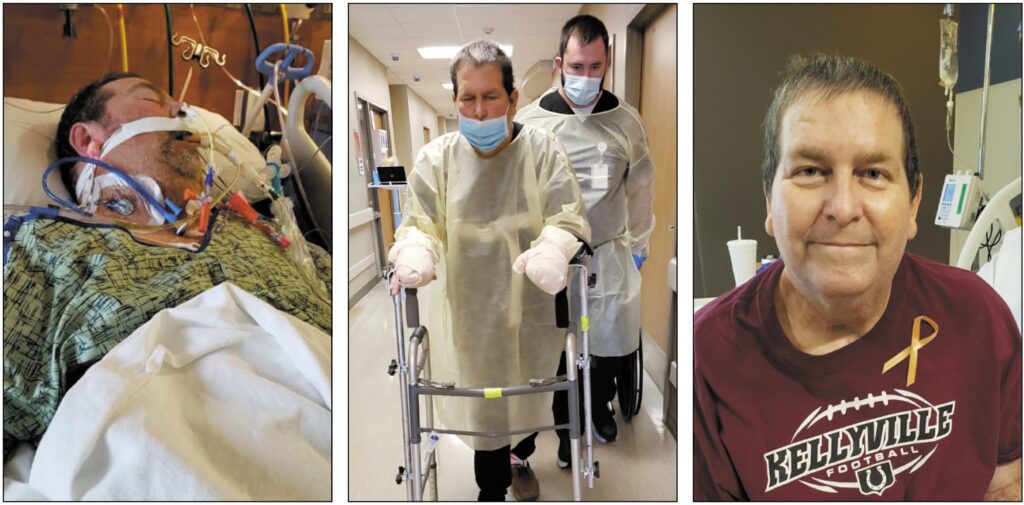
On April 1st, Rodney had recovered enough to be moved out of Oklahoma Heart Institute to a Post Acute Medical facility. On the way there, it was arranged for some friends and family to visit him in the parking lot of the PAM facility, right there in the ambulance. The first person to open the door was someone he hadn’t seen in months: his father.
“We thought we’d be there for an hour, and we were there almost two,” Kim said. “They let everyone who came to see him come by. Rodney talked with every last one of them. Remembered who they were, and everything.”
COVID had stripped Rodney of all of his motor skills, and he spent the next several weeks learning to speak and eat again. In late May, Rodney’s brother called and spoke with him for a few minutes, before passing the phone off to his father. The two of them were working on the floors of his house, and a lot was happening. After talking with his dad for a while, Rodney asked, “Hey, can I talk to mom?”
The phone went silent. Finally, Rodney’s dad said something about needing to finish the floors and hung up. Rodney looked at Kim, quizzically. “They’ve got a lot going on,” she said. “They probably just need to get it done before it’s too late.”
Rodney wasn’t convinced. “Is my mom sick?” he asked her. Quietly, Kim replied, “No.”
There was a pause. Finally, he asked, “Kim, is my mom alive?” She looked at him and said, “No, babe. She’s not.”
Coming to terms with the fact that his mother was gone was difficult for Rodney, but through the whole journey, his faith never wavered. In fact, according to Kim, it strengthened. “He’s always been outspoken, but not really about God,” she said. “After he woke up and began to talk, he began to talk to everybody about God. Doctors, nurses, everybody.” Rodney and Kim were united in their response to Rodney’s journey: “God’s got a plan.”
“God’s got a plan”
One nurse, in particular, made an amazing transformation because of Rodney’s testimony. She told him one day that she’d lost her mom, and gotten angry at God, and decided she didn’t believe in Him, anymore. Rodney quietly told her, “I’ve lost my mom. I still believe in God.” The nurse left the room with tears in her eyes. The next day she returned and told Rodney that the night before, she’d gotten on her knees and begged God for forgiveness. “If you’ve been through everything you have and haven’t lost your faith, then how can I not do the same?” she told them.
During Rodney’s April ambulance visit, a pastor was among those who visited him. Before he left, he placed a small handmade cross on Rodney’s chest. Rodney, who couldn’t yet move anything but his head and neck, asked the pastor to pray over it, and anoint it. He later asked for more of these crosses, and as he began to share his story with those he met, he started handing them out, encouraging people to put their trust in God. Later, the pastor saw Rodney again and asked him if he needed anything. “Yes,” Rodney said, “more of those crosses.” Glen Seaton, the man who makes each one by hand, has rejected every offer of payment for them from Rodney. “I’ve heard your story, I’ve heard about what you’re doing,” Seaton told him. “One day, I’m going to meet you.”
Rodney continued to recover, but COVID seemed to be chipping away pieces of him at every opportunity. On August 27th he had surgery to remove eight of his fingers down to the middle knuckle, including all five on his left hand. Amazingly, he is grateful. “The doctors said they might have to take the whole thing. I really thought I was going to wake up with a nub,” he said.
Kim said that Rodney has embraced his new lease on life with humor and steadfast determination. As he attended physical therapy, he began to regain the use of his left arm and hand. Rodney says the loss of his fingers hasn’t cost him much. “I can write shorthand, now!” he laughs.
The community of Kellyville began to orchestrate a fundraiser benefit for Rodney, to be held the first weekend in October. Though he had barely begun his physical therapy, Rodney told the doctors, “I need to be at that fundraiser.”
His doctor told him it wasn’t possible. “You’re going to be in this facility until at least the end of October, maybe into November,” he said.
Rodney wasn’t moved. “You ever have a patient go AWOL?”
The doctor looked at him strangely, not getting the meaning. “Is that north or south of Tulsa?” he asked.
On October 2nd, Kellyville citizens held a benefit in Rodney’s honor during the Kellyville Little League football game. Rodney Crall, who wasn’t supposed to have survived two rounds of ECMO, who was told he’d be on oxygen for the rest of his life, who was told he’d never make it to that fundraiser, was wheeled out to the 50-yard line of the Kellyville football stadium, and, slowly but surely, stood up to wave at the cheering crowd.
The benefit raised over $10,000. “Even people from the opposing team donated,” Kim said.
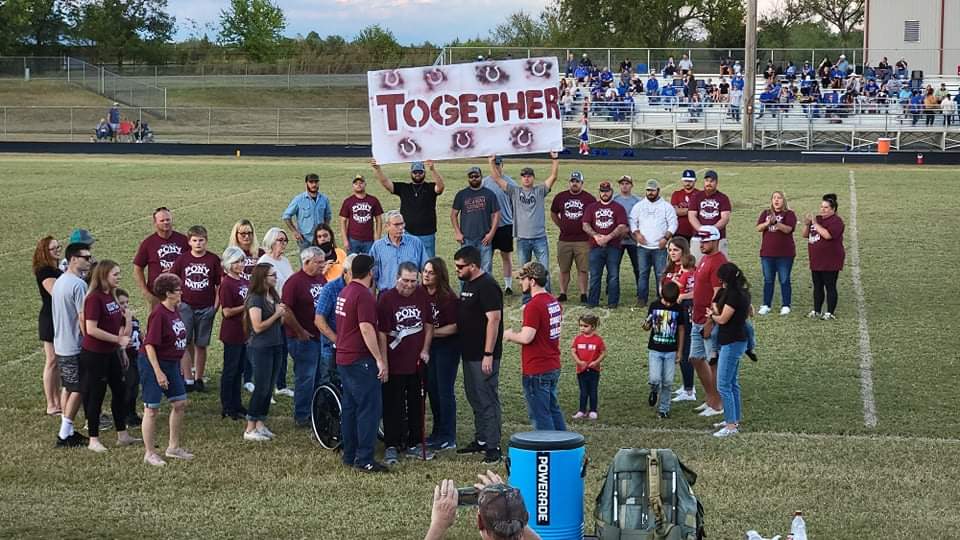
The family is moving on, some in their own ways. Rodney’s 81-year-old father, who has lived his whole life in Kellyville, has just sold his house, saying it was too hard to stay there when he didn’t have his wife. “Every room reminds me of her,” he says. Kim says he has family in different places he’ll visit, and that they’d be open to having him if he wanted to come back to Kellyville. “We’ll get him his own place, right on our property, if that’s what he wants,” she said.
Rodney is still in recovery and is starting a new round of physical therapy this week. Though he still spends most of his time in bed or in a wheelchair, he says that he will eventually return to his job at ODOT. For now, he’s doing what he can to keep improving, day by day. He says he’s had the best doctors and nurses, but mostly, he believes that he’s survived all he has for a reason. “God has a plan,” he says.
Well, we know better than to argue.
Did you enjoy this story? Want to read more great stories like this about people in your community? Consider subscribing to a Sapulpa Times Print or Digital Edition.
Want to stay in the loop with what’s happening in the town we love? Get our free email newsletter: The Timeloop!


